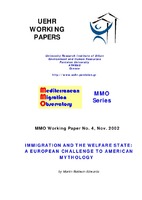Immigration and the Welfare State: A European Challenge to American Mythology

Συγγραφέας
Baldwin-Edwards, Martin
Συλλογικό όργανο
(Other)Ημερομηνία
2002-11Προβολή/
Θεματικές επικεφαλίδες
welfare/migration regimes ; European Union countries ; welfare system ; patterns of immigrationΠερίληψη
Conventional accounts of migrants and European welfare states have reached no conclusion about
the relationship, but are generally one of two extreme types: either that states will try to exclude
immigrants from access to citizen-based socio-economic privileges, or that states will tend to be
inclusive of immigrants through recognition of internationalised human rights. This paper
challenges various over-strong assumptions underlying such accounts. In this framework, two sets
of variables are posited: the precise functioning of each welfare system [funding level; activities;
benefit types; redistributive effect] and type of immigration [asylum seekers; workers; family
members; illegal migrants, etc]. From existing empirical data and secondary analyses, a
paradoxical relationship is observed: that generous redistributive welfare states tend to attract the
lowest skilled and most welfare dependent migrants, whilst non-redistributive welfare states tend to
exclude legal migration and attract illegal migrants. It is argued here, that the same institutional
factors which shaped welfare systems also shape immigration policy, thus leading to this perverse
effect. Ideal type welfare/migration regimes are characterised, following this analytic framework.
It is suggested here, that rather than create additional and more complex welfare dependencies,
countries from all regime types need radically different approaches to immigration which aim at
labour market and social integration appropriate for each individual country. This can only be
achieved through closer European collaboration and institutional reform.
